Concrete Operational by Richard Galbraith (and others) is the most ambitious project ever covered by Self-Publishing Review. In fact, it might be the most ambitious project I’ve ever seen of its kind, self-published or not. It combines a novel, art book, and CD in one package, all centered around a single story – a plausibly prophetic vision of the future. About the novel:
Germany Germany, a man who was free, a man who loved, now an instrument in their machine. They have turned him into the very thing he hates, what he and everyone he loved fought against, the world’s greatest celebrity, a tool in the subjugation of man.
But the memories of freedom and love remain, and he will fight and change the course of human history for the better, but at what end?
As humanity progresses and turns to face the eternal black of the universe, the questions of free will and fate, of love and peace, of the riddles of time itself will arise and Germany will be called upon. But is his will strong enough, his his mind ready to breach the void and provide us with salvation?
The whole thing needs to be experienced to be fully appreciated – so you’ll have your chance at the bottom of the post. Also a first: win a free copy (contest over!) of the entire Concrete Operational box set by tweeting, Facebooking, blogging, or what have you about this post and be in the running to receive a copy. Next, leave a comment on the post that you’ve linked in some way. If you’ve spread the word via a private account like Facebook, that’s just fine. We’re doing this on the honor system. We’ll then select a winner.
I asked Richard Galbraith about his project and what it took to bring it all together.
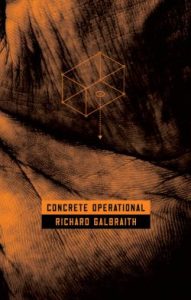 Self-Publishing Review: One of the first things that leapt out at me was this: the book says it’s “Supported by the National Lottery through Arts Council England.” What does that entail?
Self-Publishing Review: One of the first things that leapt out at me was this: the book says it’s “Supported by the National Lottery through Arts Council England.” What does that entail?
Basically, the support from the National Lottery and Arts Council England is what separates the novel from a vanity project and pushes it into the realm of independent publishing. Whilst I did invest some money into the process myself, I basically pitched the whole project to the Arts Council England, who give grants from £500 to millions of pounds for arts projects. I applied for £5,000 and got it, that’s basically what it cost to produce the project, soup to nuts, including everything from art materials for the artists, to professional studio time for the musicians, seven days gallery space in a prime location in East London and everything in between. The process is very, very difficult,with about 75% of applications for grant money being turned down due to demand, so I was one of the fortunate few really.
The whole process, from filling in the application form, to producing a full project proposal – which came in at 5,000 words alone – through to being awarded the money is very time consuming and is a lengthy process. It’s very chicken and egg, because you can’t apply for a grant without having considerable amount of the work already in place, but you can’t get the work in place without spending money, so some long nights were spent wondering whether I’d actually get the grant, and if I didn’t what would I do about all the money I had already invested. Luckily I did though, so it all came together very well.
If anyone really thinks they have something to give the community in terms of art, they can apply for the money, which is great that it exists, although with the global recession the government is cutting vast amounts of arts money, it means a lot of projects like Operation Concrete will never see the light of day, which is just awful.
SPR: That still sounds like self-publishing though – because although you went through a proposal/grant process, you still ultimately self-released this, is that right? It’s more a question of who paid for it.
RG: Yeah, I guess it’s a murky ground, so, in reality, the Arts Council England paid for it to be published, but I, along with a professional designer in Michael Cranston, professional proof reading and editing agency in The Oxford Editors and a host of other awesome professional people put the project together. I like to class it as independent DIY really, it was done by myself, but with a lot of help from a lot of other great people. Sponsorship comes into part of applying for English arts council money as well, as you have to have raised at least 1/3 of the cost of the project yourself. So in this regard, the Oxford editors, in exchange for advertising in the novel, and throughout the project, proofed the book for free, which is worth a couple of thousand pounds for a 90k word novel. Then everyone else worked for minimal budget or pro-bono, so the cost of their usual hourly rate for filming, acting, graphics design, music production, press, event production, etc was all reduced massively. It was tough convincing people to take part and do things for free when I had nothing and no arts money yet, but if you believe in something enough, you can make it happen.
SPR: The packaging itself is very ambitious. How did you go about finding a way to package a novel/art book/and CD? Did you design it all ahead of time and see who was up to the task?
RG: To be honest, this was the most difficult part of the whole thing, a completely new learning experience for me. I had to do 3D designs of a box and polystyrene insert, like actual technical drawings and send them to packaging firms and companies across the UK, and being a writer anything with numbers doesn’t really work with my head, so it was a real nightmare getting the measurements right. Also the thickness of the novel and art book kept changing because of the last minute revisions to everything, so it was a really difficult process. In the end I had a friend who runs a theatrical props production studio, they were going through a quiet stint because of the recession, so once he heard about the project, he said he’d do 200 of the boxes in his studio, make them look amazing for just the cost of materials which was completely amazing. But imagine hand gluing 200 boxes together, with a production line of 4 people, it took a very long time! But it was well worth it as the box-set looks great now. The phrase, ‘it’s not what you know, it’s who you know’ really bares true with a lot of the project and the packaging in particular. Being in a city like London is a massive help as well, as there’s always people looking to get involved in things to help out their portfolio etc.
SPR: On to the book. What makes your take on the apocalypse is your take on celebrity, and how that contributed to civilization’s mass delusions. So where did this book come from? I imagine you don’t think this is literally prophetic, but figuratively at least – do you see celebrity worship as apocalyptic?
RG: I see the whole scenario as more of a dystopia rather than an apocalypse. Two things brought it about really, my personal hatred for the cult of celebrity, everything it means and everything it stands for, combined with the fact that at heart, I’m a little bit of a Marxist.
Part of Marxist theory is how the bourgeoisie dominate and exploit the proletariat, Marx said that the only way this can be overcome is through violent revolution and the seizing of power, so it is in the interest of the bourgeoisie to ensure that the proletariat are distracted and unconcerned with how they are being exploited so they can remain in power and avoid revolution.
Now, celebrity can be seen as a vehicle for this, fewer and fewer people are concerned with political struggle, and deserved power, and inequality, the cult of celebrity has taught them that they can have it all and have it now, all they need is a story, it’s the ultimate distraction and it doesn’t really exist, it’s a complete fallacy, a wall of mist to stop people being concerned about real matters.
So my thinking was, what if we took this to the absolute extreme, what if the entire world was so obsessed with becoming a ‘star’ on a world platform, that it actually began to hinder production and value, there would need to be a shift in world governance, and if that happened would a few men decide to snatch that world power?
Yes, I thought would be the answer. So, that’s where the creation of The Benefit comes in, everyone works, but everyone also has the chance to become a Star, they work to perform, and whilst they do this, they don’t realise they’re slaves to a new world order, a few men that can do whatever they want, an ultimate super elite that are removed from taking part, and control the worlds resource.
I mean, there are benefits, that’s why it’s called The Benefit, there is relative world peace, most people are on an equal standing, and other such things, but it comes back to the ultimate question, freedom or peace? And so I go about trying to explore that concept in the first stage of the novel. And whether or not I feel it’s going that way now? Well, I think it is personally, so many are so distracted, I find it abhorrent, but there’s a lot of other counter arguments as to why it’s happening, why its escalating and whether or not it will get worse in the future. I’m still unsure, I contradict myself a lot, which is good as it means I argue with myself so I can see both sides of the story, and potentially write something half interesting.
SPR: Yeah, I regretted “apocalyptic” almost as soon as it was out. Dystopia is definitely better. It’s just that in a world that’s crumbling around them, they’ve set up a colony that feels a bit like a post-apocalyptic enclave. I like it – it’s like Aldous Huxley’s take on celebrity. Instead of Soma, you have the false inebriation of fame. It’s also a bit Matrix-esque – not in the sense of technology, but that the colonist’s want to live in real reality, even if it might be more of a struggle. Comparisons, though, might make it seem like the book’s unoriginal, which it isn’t, but it’s definitely following in those traditions. Were those the sorts of influences for the book?
RG: You’re right, there’s part Orwellian dystopia in there and Huxley utopia, I don’t like to think it’s confused, I just think it’s one take on one channel that mankind could potentially take and has characteristics of many different possible looks at the future. There is the aspect of the colonists wanting to live their own lives, it’s an old tome in science fiction and all literature really, there will always be people who want freedom, and those who want that freedom hold it as the greatest possible gift any human can have, anyone without it is a slave, and it must be stopped, but what if the people inside aren’t ready for it, what if they like their lives? It’s cross-over of good and evil and right and wrong. There’s a paradoxical argument really. A. This man is not free, I must free him. B. If someone is happy what right do you have to take that away? A. But with freedom they will be happier than they are now, because they will have choice. B. But choice means responsibility, free will gives the ultimate responsibility, others may be happier without that responsibility…and it goes on as such, moral and philosophical arguments about freedom, free will, choice, all that sort of stuff I find fascinating and this is where it gets really complicated, because later in the novel I go on to explore facets of fatalism, determinism, causality, incompatibilism, and other such arguments. I’m personally an incompatabilist, which means I don’t think you can believe in determinism and free will without being logically inconsistent, there is either one or the other, and the ultimate question comes in when you ask someone, which would they prefer, to be responsible for their actions, or be free of moral guilt for their actions? If you could do anything you wanted and have no guilty feeling for that action, because you knew it wasn’t your choice to begin with, would you want that? Is that, in itself a form of freedom? I’m no philosopher or academic, but I wanted to try explore all these arguments and counter arguments to help try and figure out a few things for myself, and they’re all incorporated into the novel in one way or another.
Literal influences come from Philip K Dick, Joseph Heller, Bret Easton Ellis, Hunter S Thompson, Robert A. Heinlein and Alfred Bester to name a few.
SPR: Switching to the art book. How did this part of the project come together? The book excerpts a piece from the novel and then the corresponding artwork. Did the artist choose this sequence, or did you? You mention in the intro that ebooks, print on demand etc. is “secondary to the true reasons for the written word, art, and music: to explore the emotion that its creation derives.” Do you see this as a pioneering work that might become more common in the future? I wonder also with the capabilities of the iPad if you could see this work being incorporated into an app so that the novel/artwork/and music could potentially be accessed at once.
RG: The art book came together through the process of crowd sourcing really. Once I had settled on the five extracts and their meanings, the rest was just about finding British artists who’s work I felt fit the criteria of the piece, I didn’t want an exact match, but something that would bring out their skill as well as my words. I searched hundreds of artists, and emailed probably about 50, to end up on the last five. It was again a little bit of a chicken and egg process, I wanted to get artists on board, and needed to have them on board so I could take my proposal to the arts council for funding, but it was difficult to get people on board without the funding already in place, lots of smooth talking and repeating of the statement ‘everything’s going to be great’ was necessary!
Regarding the second part of your question, I don’t really see it as pioneering, you can find dozens if not hundreds of collaborative projects that are happening all the time, but I do think it is part of the future of media. As the consumer demand more and as the format shifts to digital, words are going to be increasingly synced with art and music I feel. So the guy or girl on the tube with their kindle can have a complete sensory experience, just whilst sitting there, absorbing ambient sounds to the words and interlacing them with amazing art. So yes, in response to your question about he ipad, I think it is going to be happening more and more, I was just reading this morning about an interactive app that combines words, art and music for the H.G. Wells classic, war of the worlds, for the ipad, so if they’re starting to re-invent the classics, you can sure as shit bet that new producers are going to do it with their new content.
SPR: Is it common? Because I don’t know about a lot of works that combine a novel with music. I’m definitely interested in it, because I do it myself. http://www.badbadbad.net is another. I saw that War of the Worlds app too, which looks excellent. Recently saw Philip Roth decry that the novel is going to die because it can’t compete with the screen – not necessarily because so many works are going to combine both.
How did the CD come together? What’s interesting is that all the songs are different. Was this curated in the same way as the art book? Are you a musician?
RG: To your first point, I feel it’s increasingly common, but not commonplace yet, I think those that are trying cross-over media, between novel, art, music, are really at the forefront of what will be happening in the future. I don’t think publishing houses and majors are doing it at the moment because they’re simply trying to figure out what their future is at all, with all the disruption to publishing formats, and such, that’s why I say, that sort of thing shouldn’t get in the way of creativity, and that’s why indie and DIY always lead the way for larger scale, because we have the facility to turn things around quickly and without too much risk.
In regards to the CD, it was curated in a similar way to the art-book, but with different areas of ease and difficulty. Organising five artists you have five people, and although they can take much longer because of the process that is creating a painting, they are generally much more easy to organise. With five bands, I had approximately 20 people to organise, as well as multiple recording studios and a CD manufacturing firm, so it was much harder. Three of the bands now actually play under different names, as is the life-cycle of a reasonably established but also new acts, but that’s not really a problem, we created something in a moment that encapuslated how they felt about the extracts and emotions that had been provided to them, and it sounds great. I wanted different sounds, just the way I wanted different genres of art for the art book, so you have oilpaintings through to hand drawn illustrations, the music moves through heavy metal to ethereal electronica, so it makes for an interesting listen. And finally, no I’m not a musician, I tried and was awful, so I became a music journalist, and have run my own music magazine and freelanced a lot since, but that’s on the back burner for the moment as I enjoy novel writing more, I do miss all the free gigs that I got to go to though!
Concrete Operational – The Short – The book trailer from ricgalbraith on Vimeo.
Take a look at OperationConcrete.com, which is a good example of an author site – especially one that has to organize all these different elements.
Get an Editorial Review | Get Amazon Sales & Reviews | Get Edited | Get Beta Readers | Enter the SPR Book Awards | Other Marketing Services


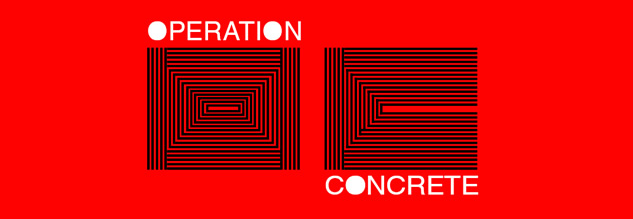
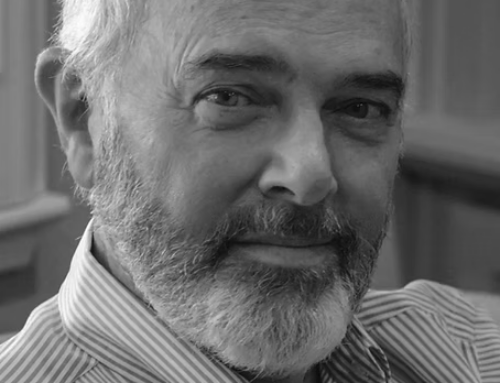









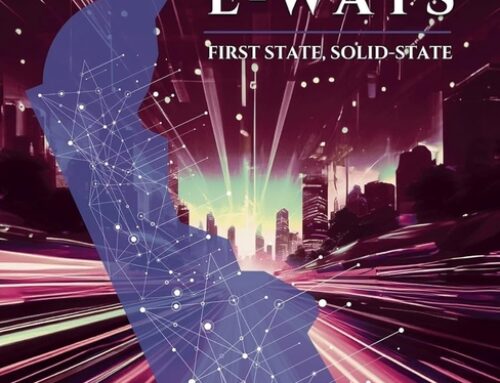




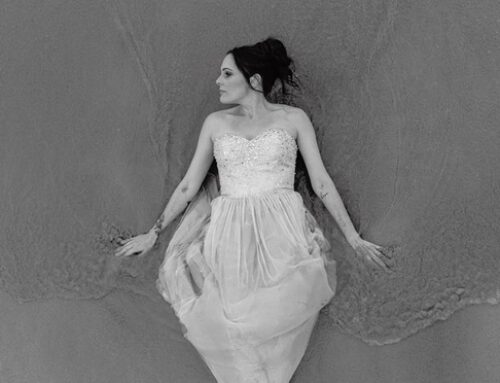
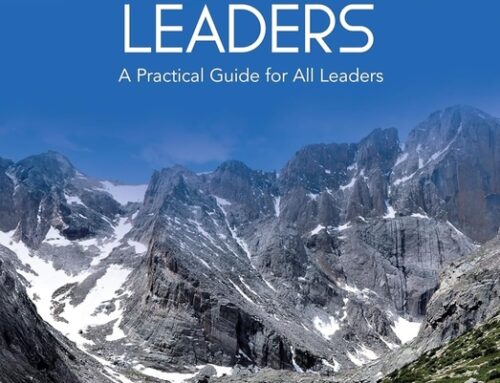
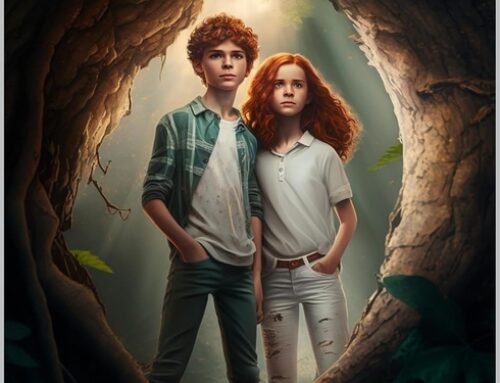

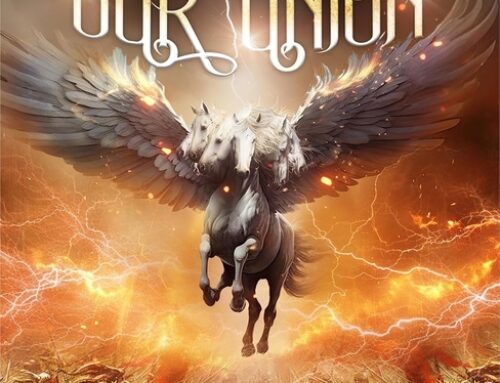
I tweeted you!
I think the idea of having a book, art book and music DVD is a great idea and must be a great experience to enjoy them all. Just wonder what your take is on offering the set as an ebook and MP3 files so they can all be enjoyed on an eReader. I realize there is nothing better than holding a physical book but hard to take on planes etc.
All the best,
Cliff
@cliffspicer
Henry, this is extraordinary. This is Magister Ludi-The Glass Bead Game that Hesse envisioned, a multimedia event to delight all the senses, and uplift the audience using both cool and hot media. Marshall McLuhan predicted this. And for years I’ve wondered if this is the way to help readers experience Finnegans Wake. Congratulations to Mr Galbraith for pushing this complicated project through. I’d love to see the result.
Cool idea, and it looks like it’s beautifully packaged, too. Thanks for alerting us to this one, Henry. (I’ve shared this on Facebook.)
Hey boys! I want it! I want it all! Give it to me now! Please!
Seriously though your package looks great. Wait, that still sounds suggestive.
Really, this looks like some fantastic reading, and Henry, I have your book “The American Book of the Dead” on my Goodreads to read list. I’ll have to add your others.
Sincerely, Geri Montano P.S. I tweeted and retweeted
Hey there, I posted your vimeo short on twitter and facebook.
I just finished reading a long novel by Margaret Atwood and I am looking for something intense to read next, something to inspire new experiments in my art. I think “Concrete Operational” is it. I really find your concept of this kind of collaboration fascinating and forward thinking. Even if I don’t win the package, I am intrigued enough to purchase the novel. -Sincerely, Geri Montano